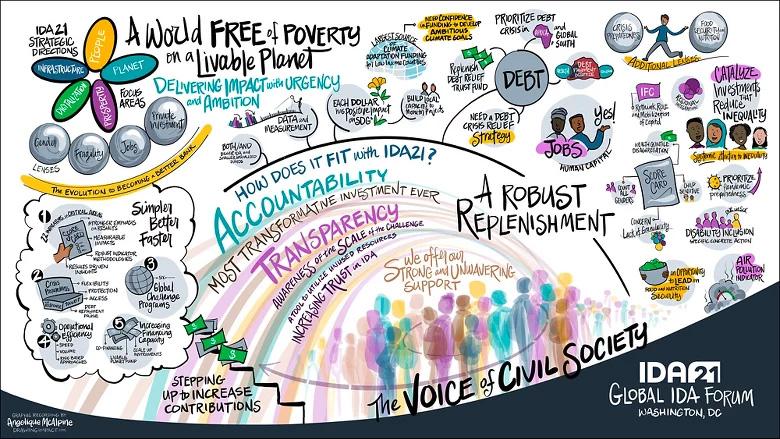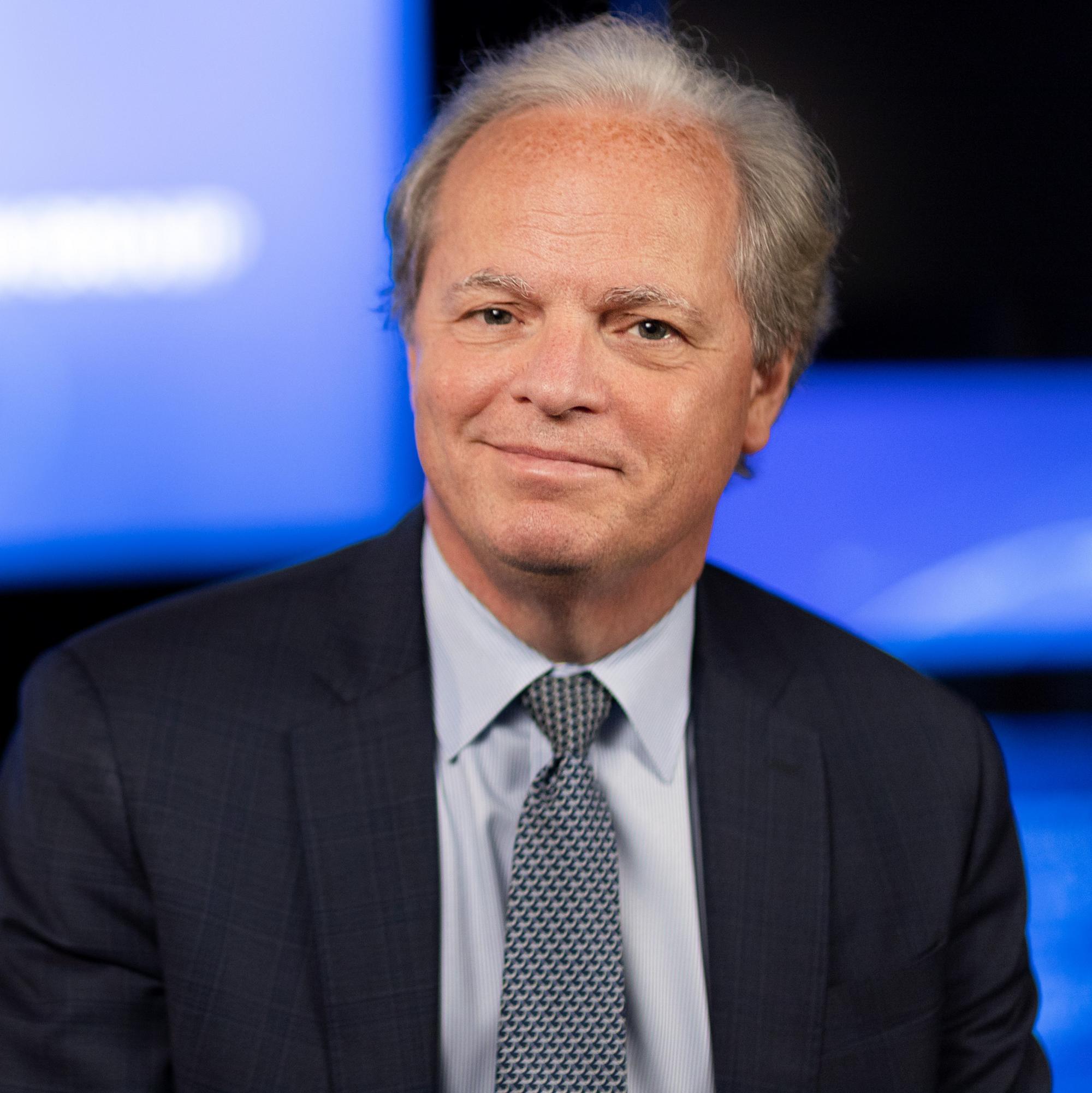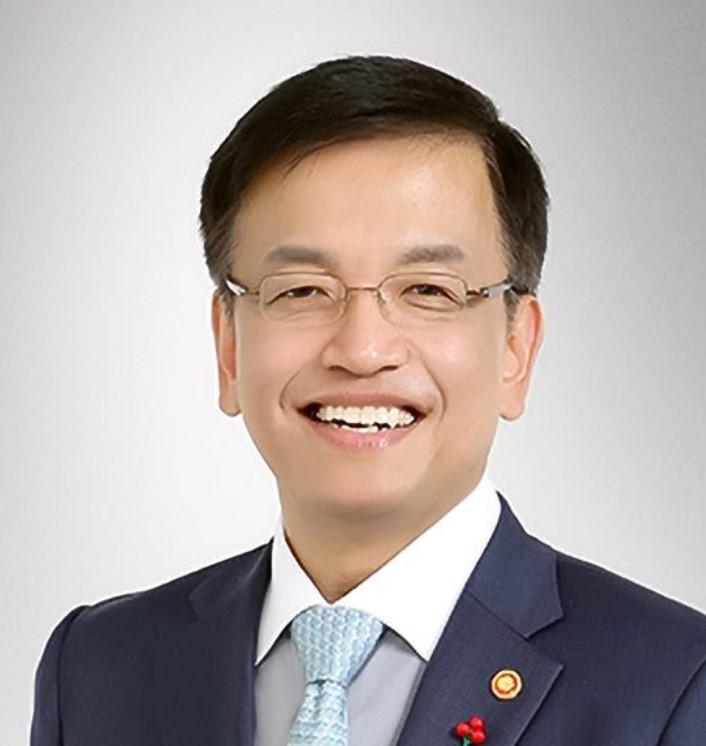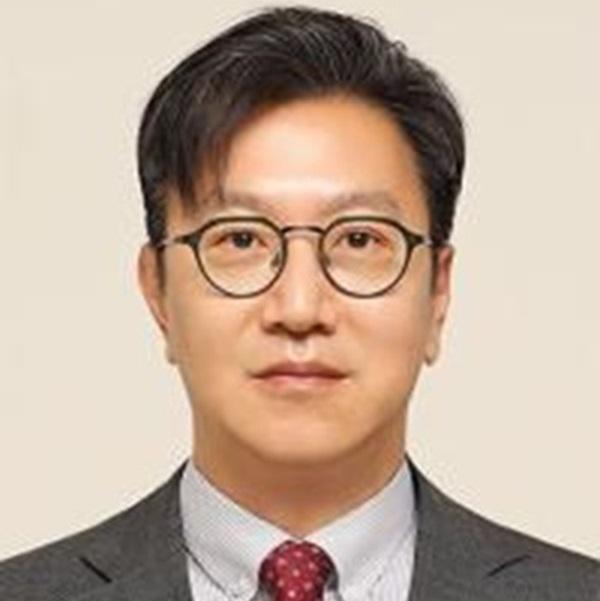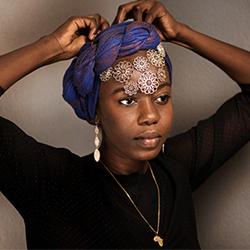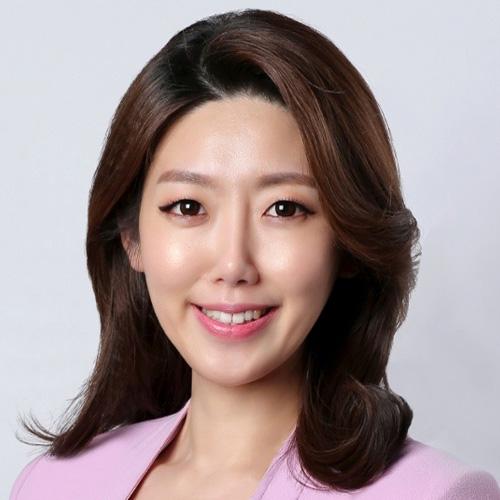GO TO CLOSING SESSION
OPENING SESSION
[Performance by Yeonah Kim]
[Applause] [Video playing]
[Kelly Park] Good morning, your Excellency, Beomseok Kim, First Vice Minister of Economy and Finance of Korea. Axel van Trotsenburg, Senior Managing Director of the World Bank, IDA21 Independent Co Chair, Sheku Sesay, IDA borrower and donor representatives, distinguished guests, ladies and gentlemen in the room, and online, greetings to you all, and welcome to the Final Replenishment Meeting and pledging of IDA21 live here in Seoul, Korea. My name is Kelly Park, your host for this opening session, and it is with great honor to stand before you at this pivotal moment celebrating the IDA21 replenishment journey. Now, before we proceed, can we have another big round of applause to our 10 year old Yeonah Kim for the marvelous performance? [Applause] [Kelly Park] Thank you. What extraordinary talent to behold. Now, Yeonah Kim is a very gifted and talented violinist to winning numerous international competitions. She became famous after her impromptu performance with a famous YouTuber in Rome, which went viral performance all around the world gaining millions of views, leaving people in awe. So, it’s definitely a very inspiring way to start this historic day. Thank you very much, Yeonah Kim. And yes, it is a very historic day today because the investment we make today will determine the collective future, determine the world that Yeonah Kim and her generation will inherit. Now, ladies and gentlemen, this room wields enormous power, power to make bold decisions that will benefit all of us at home and abroad, and it is all in your hands. Now, it is also a day to celebrate the transformational impact of IDA and what we have achieved. Now, to begin today’s meaningful occasion, it is with great honor to invite Korea’s First Vice Minister of Economy and Finance, his excellency, Beomseok Kim. Please, welcome him with a big round of applause. [Applause]
[Kim Beomseok] Good morning. I would like to thanks and extend my gratitude to Senior Managing Director, Axel van Trotsenburg, Co-Chair, Sheku Sambadeen Sesay, and representatives from member countries for joining this IDA21 Replenishment Final Meeting. I also want to thank the World Bank Group [unintelligible], the IDA team, and everyone who worked tirelessly to make this meeting possible. First of all, I would like to express my gratitude for your attending this meeting despite earlier event. Though the event went through a peaceful and democratic process, our economic and political status remains stable, and we continue to operate without any disruption. I believe that the process of resolving earlier event is the evidence of Korean democracy resilience. I can assure the safety of all participating delegations. Dear fellow representatives, since its establishment in 1960, IDA has supported one of the largest concessional resources supporting low-income countries. Present global changes, like climate change, conflict, and food security demand a more proactive role from IDA. At this crucial juncture, hosting this final meeting in Korea holds special meaning for us. Korea began its journey with IDA as a recipient country in 1962. At that time, Korea was struggling in the aftermath of the Korean War, and the IDA provided 160 million dollars. With their support, Korea was able to build the infrastructure such as railways and highways, laying a strong foundation for national development. Today, Korea has become one of the world’s advanced economies. This inspiring story is recognized by the World Bank as a growth superstar and required reading for developing countries. Korea’s development journey exemplifies IDA’s vision and values for shared prosperity. With the vision of becoming a global pivotal state, now Korea strives to take a leading role in tackling global issues, such as eradicating poverty and addressing climate change. I look forward to seeing more inspiring true stories made possible through robust and impactful IDA support. With this unique experience in economic development and innovation, Korea stands ready to strengthen our cooperation with the World Bank to support developing countries. During the G20 Summit in November, Korea announced a 45% increase in its contribution to IDA. High interest rate and supply chain disruptions are making the global economic landscape even more challenging for many countries, including Korea. Even amid these difficulties, Korea’s contribution reflects our steadfast support for IDA and its successful replenishment. This also demonstrates our determination to return the support we received in the past. I truly hope that Korea’s commitment will lay the foundation for active participation and contribution from fellow member countries in this final meeting. Dear fellow representatives, to ensure robust and impactful IDA support, we need more than just ambitious replenishment. How we design policies is equally important. Throughout the intense discussions this year, we agreed on 25 policy commitments of IDA under the vision of ending poverty on a livable planet. Today, I would like to recommend three pillars that can serve as the foundation for IDA’s future policy directions. The first is to ensure IDA’s performance orientation. The limited resources must be used where they can have the greatest effect. The shift from an output base to an outcome center scorecard is a welcome change. At the same time, IDA’s performance-based allocation can further incentivize the reforms in recipient countries. These reforms can break through in efficient systems and practices, successfully transforming countries into high income economies. The second is to preserve IDA’s sustainability. Through IDA’s unique funding mechanism, each dollar from donors can turn into 4 dollars in support. The backbone of this multiplying effect is in IDA’s AAA credit rating and preserving it is of utmost importance. We must work together to strike a balance between taking an active role in tackling global changes and maintaining the financial sustainability of the IDA. Third is to ensure partner space in IDA. The United Nations has reported that the global development finance gap has increased from 2.5 trillion dollars pre pandemic to 4.2 trillion dollars today. The massive demand cannot be met by public resource resources alone. In view of this, I welcome the expansion of IDA’s private sector window, which will further mobilize private resources. As a World Bank rule, close cooperation between IDA, IFC, and MIGA will help open channels for private capital to flow into development effort. Different partnership with civil society, philanthropies, and other MDBs is important. Expanding the donor base is also crucial, and Korea has committed to joining hands in this effort. Fellow IDA representatives, we are facing formidable global change, such as climate change, conflict, and food security. Yet, I strongly believe that we can rise to meet these challenges together. With IDA’s invaluable assets, which is 65 years of experience, knowledge, and networks, combined with the cooperation of fellow member countries, I am confident that we can deliver stronger and more impactful support. As we begin this two-day meeting, I look forward to a successful replenishment that demonstrate our strong commitment to overcoming global change together. Thank you. [Applause]
[Kelly Park] Yes. Thank you, his excellency, First Vice Minister Kim, for the thoughtful remarks highlighting the importance of this occasion and the power of global cooperation as we embark in this journey together. Thank you very much for your dedication and support. Now, the significance of being here in Seoul cannot be overstated. The film that we’re about to watch will educate us a little bit more about the extraordinary transformation that this country has undergone within a space of one lifetime. The transformation that has been supported by IDA.
[Video playing] [Kyungwook Hur] Of course, we need to keep developing. But I guess the most important thing is that we should make sure the next generation always has the confidence that tomorrow is better than today. [Jinhee Park] My past generations’ dedication and sacrifices, really made a difference for me personally and also for the Korea’s economy. I had access to a quality education. I could study abroad, having an opportunity to look around and broaden my perspective. At that age, my grandmother had to go to work. So I’m really grateful that they opened up opportunities for me. What I have now. Where I am. [Kyungwook Hur] From the 1960s on, we changed to outward-looking policies. We began to grow our exports. We didn’t have any infrastructure. The first infrastructure I remember was probably the Gyeongin Expressway from Seoul to Incheon, which is our export harbor. And dams, to provide clean water. Most of those things were supported by the World Bank. Whenever we had a visit from the World Bank, they were taken straight from the airport to the Blue House. The president himself wanted to listen to their advice. [Jinhee Park] The support we received from international cooperation wasn’t just financial, I think. It was more of an investment in future of Korea. I think international organizations like IDA played a key role in the economic development of Korea, especially in the early years, when they had a really challenging moment. [Kyungwook Hur] During the Asian Financial Crisis about 15 or about half of the top 30 conglomerates went bust. Many banks were closed. People were losing their jobs. It fundamentally changed Korean society. But then again, one thing that was really driving us all was the voluntary gold donations. People came up with their family jewels and trinkets. They just wanted to give their gold for the nation to avoid bankruptcy. The driver behind that was really, really, very moving. There is this patriotism which comes from, even though it’s not spoken, but unspoken belief, that the country’s destiny and people’s destiny are together. We are working together for the happiness and progress of the country. When we really began to feel we were becoming a prosperous country was 1988, the Olympic Games. The Olympic Games is a symbol. What happened in 1986 to 1988, for those three years, somehow the stars got aligned at the time. So that our exchange rate was low, so our exports really began to boom. And believe it or not, it was only in 1986, we first had a current account surplus. And then we had the 1988 Olympic Games. Those 30 years of efforts finally began to pay off, and we performed very well at that Games. So the host-country advantage and with all the countries’ enthusiasm and momentum. And I guess that’s the time shared by every Korean. Korea has now moved into different stages. [Jinhee Park] I think, Korea’s story shows how a clear vision of the government, commitment to education, and international support, can achieve sustainable growth. Korea’s story is exemplary where from a war-torn nation, the country became a tech powerhouse. And also, in such a short time, Korea transformed from an aid recipient to a donor country. I would love to see Korea use its advancement to empower other nations as well, with the sustainability and resilience mindset that we have. Generation-wise, I want a society that appreciates the past generation’s sacrifice and dedication, but also I want to make a positive legacy for the future generation as well. [Emotional music] [Video ends] [Applause]
[Kelly Park] Thank you. Yes. Thank you, his Excellency, Ambassador Kyungwook Hur and Jinhee Park for the powerful testimonial. It is clear what IDA represents and all of you are contributing too here today. Now, as the ambassador says, ensuring that the next generation can always have confidence that tomorrow will be better than today. IDA represents a global cooperation at its very best because IDA recognizes that across the world, we are interconnected and intertwined, and the future of people and planet are bound deeply together. So, to ground us in that vision and before we start our next two days with technical discussions, the World Bank has invited Emi [Emtithal] Mahmoud, globally renowned poet, activist, and UNHCR Goodwill Ambassador to reflect on the higher essence and impact of IDA on her new piece of work. Ladies and gentlemen, please turn your attention to Emi.
[Applause] [Video playing] [Emotional music] [Emtithal Mahmoud] I’ve heard tales of the early famines in Sudan When the saplings withered And the earth stood still And the food couldn’t keep the cattle And the mouths of babes ran dry As the riverbeds I heard the tales from our moms and dads Our aunts and uncles who lived to say One day I ate one day my neighbor We weathered the storm Together Sawa; Hammke All of us or none of us Our neighbors, where are they now? Can they not hear us? Can they not see us? Do they know? About the sickness? The storms? Do they know about the hunger? The wars? In the darkest hour who do we call to light the flame that brings the dawn? What a sunlight to a night that never ends? A new day When I think of the future I imagine my brethren before myself I remember my sisters who lifted me up Who opened every door and closed not one behind them how they triumphed against all odds becoming more than this world ever imagined for them from the walls of humble homes to the halls of Ivy Leagues I remember the mountains, how they reached back as they climbed how our hands grasped one another’s Eyes locked as if to say I’ve been where you are before, I will hold you up I will not let you fall ¡Oye! Listen, do you hear it? The pledge To hold one another in times of hardship To lift 1 another in times of doubt? To transform lives To light the flame that brings the dawn? Do you hear it? To our humanity? Our resilience? To call for help and answer too? The pledge? To our increased devotion to one another? This earth our home, every one of us a bringer of change Each helping hand returns 3-fold A thousand futures Just within our reach The bridges of Bosnia; The hospitals in the heart of CAR The books in Seoul; new homes in Nepal The promise of peace in Sudan, the Congo or beyond Disaster has never carved a wound that sisterhood couldn’t mend never brought a hunger that brotherhood couldn’t feed never torn a fissure that humanity couldn’t heal And today will be no different; today our heads won’t turn away Our eyes will only open our hearts will only grow, our hands will only build And when our children ask what did we do to bring the dawn? What did we build to end the loss? We will bathe in the light of our togetherness and say each other. [Video ends] [Applause]
[Kelly Park] Wow. Thank you, Emi, for those empowering words. It really hits home what the next two days are for. You have heard her mention the sound of the pledge. I would like to take this opportunity to recognize some of our donors who have come forward with their early pledges to set us up so well for today. First, out of the gate, back in September, was Denmark who announced a 40% increase on their last commitment. Please, give a big hand. Thank you, Denmark. Just this week, Croatia too, announced a generous increase of 115% increase. Thank you, Croatia. Next, our host and my home country, Korea, has committed to build on their last pledge by a 45%. Thank you. Because we know how important and transformational IDA can be. Thank you once again. Latvia has announced they are increasing their commitment by an enormous 60% increase. Thank you, Latvia. And now, moving over to Norway too. Announcing an increase of 50% on their last pledge. Thank you, Norway. And now, going over to Poland, doubling their previous commitment. That is 100% increase. Thank you. Thank you very much. And now let us look at Spain, another country that has come early with a fantastic pledge increasing their contribution by 37%. Thank you. And next is the United Kingdom also announcing just last week a pledge of 1.98 billion pounds over the next 3 years, a 40% increase. Thank you very much. And finally, the United States pledging an increase totaling a 500 million dollar increase. Thank you very much. Another big round of applause to all of our countries for their early commitment and their leadership. Thank you once again. Now your contributions have got us off this final meeting to a great start and this is the spirit that we wanna see over the next two days. Thank you very much for your contribution and support. And now, to share more on the ambition for the coming days and more of the potential impact for the coming years, it is with great pleasure to welcome to the stage World Bank Senior Managing Director, Axel van Trotsenburg. Ladies and gentlemen, please welcome him with a big round of applause. [Applause]
[Axel van Trotsenburg] Welcome. Well, very well, a very warm welcome to all of you in the room as well as all watching online. It’s good to start with these wonderful announcements. But it’s also wonderful to be here at the Final meeting of the IDA21 replenishment. And I would like to extend my gratitude to the government of Korea for hosting us, this event, and to First Minister, Beomseok Kim, for being with us here in person. Thank you very much. Clearly, we are meeting under more difficult circumstances than we had originally planned this meeting. But we are relieved that things have called down and that we can now turn to the purpose of the meeting, namely the finalization of the IDA21 replenishment negotiations. To mark the occasion, we decided that we wanted to start this meeting in a different way, as you’ll have noticed. It’s namely with cultural performances and artists, from young Yeonah Kim’s brilliant performance to the moving story of Korea’s transformation to Emi’s poignant poem, we see how the right investments in people create ripples across generations. Over the next two days, we will be discussing this, how, by working together, we can leverage the incredible power of IDA to invest in the future of 78 low-income countries around the world. This is more than a pledging session, it is a testament to the enduring power of multilateralism and our collective belief that we are stronger together. We meet at a pivotal time. The world faces unprecedented, larger-than-life challenges, from climate disasters to conflicts, from poverty to pandemics. Yet in this room, I see unprecedented resolve and solidarity. I see it in the extraordinary early commitments from our donors, who have demonstrated bold leadership with significant increases in their pledges in national currency despite challenging global conditions. This is the ultimate reflection of the domestic efforts to secure funding to IDA. Of course, every contribution is leveraged. Take one dollar contributed we will be able to provide nearly 4 dollars in mostly concessional financing to IDA countries, creating real, measurable impact where it’s most needed. This is value for money. Over the past year, we have appreciated our dialogue and exchanges with the IDA beneficiary countries, which have shared their development aspirations. I just want to recall the Summit in Nairobi to many, individual and group meetings, and this has helped us to sharpen this package. But also, we have incredibly benefited from all the IDA deputies and their teams. Sometimes we need to give them a round of applause because sometimes we address always the IDA deputies, but there are teams behind them. So, I think we should owe them a little applause, what they are doing. [Applause] [Axel van Trotsenburg] But this is just the beginning. Our decisions this week will bolster IDA and strengthen its lifeline to countries in the years ahead. What does this mean in practical terms? It means helping 300 million people in Africa gain access to electricity, in partnership with the African Development Bank and, of course, with the beneficiary countries. It means improving health services for 1.5 billion people. Strengthening social safety nets for people facing recurring shocks. And leading the way in finance for climate adaptation and many more things. As Emi’s poem reminded us, and I quote: "Disaster has never carved a wound that sisterhood couldn’t mend, never brought a hunger that brotherhood couldn’t feed, never torn a fissure that humanity couldn’t heal." This is IDA’s promise. Not just aid, but transformation. Not just funding, but partnership. Not just resources, but results. We’re engineering a better Bank for a changing world, streamlining our operations and increasing our impact. And crucially, IDA puts decision-making in the hands of our clients and building capacity for sustainable development. The journey of our host country, Korea, from IDA recipient to donor, shows what’s possible when we invest in human potential. Now it’s our turn to help write the next chapter of this story for millions more. As we enter these discussions here, let’s remember what’s at stake. The lives we can transform. The futures we can unlock, and the world we can build together. The pledges made in this room will send a strong signal to the hundreds of millions of beneficiaries in IDA countries that we stand in solidarity and shared commitment to work together. Thank you. [Applause]
[Kelly Park] Yes. Thank you, Mr Axel, for the wonderful remarks as well as your leadership and support for bringing us together to force towards a stronger partnership for a prosperous future. Thank you once again. And now, ladies and gentlemen, I hope all of you are feeling inspired, motivated and empowered. Now, you have the incredible opportunity over the next couple of days to invest in our future prosperity, in education, in health, in infrastructure, all the critical human scaffolding that enables everything to succeed. You have the opportunity to benefit all of us and invest in people, in planet, and in resilience. Now to play us out and bring us close to this opening session, I would like to once again invite our stunning violinist. To me, she represents the future of our promise. Ladies and gentlemen, please give it up for Yeonah Kim.
[Performance by Yeonah Kim] [Applause]
[Kelly Park] Thank you, Yeonah Kim, for that wonderful performance. Thank you once again. And now ladies and gentlemen, that concludes the opening ceremony and we will now hand over to our IDA 21 Co-Chairs.
(back to top)
CLOSING SESSION
[Kelly Park] Good morning, distinguished guests, esteemed partners, and ladies and gentlemen, welcome to the closing ceremony of the IDA21 Final Replenishment Meeting. My name is Kelly Park, your host for this final segment of our gathering. Now, before we begin the closing ceremony, ladies and gentlemen, please welcome our Deputy Prime Minister and Minister of Economy and Finance of Korea, his Excellency, Sang-mok Choi, and World Bank Senior Managing Director, Axel van Trotsenburg, into the meeting venue. Please, welcome with a big round of applause. [Applause] [Lively music]
[Kelly Park] Over the past few days here in Seoul, we have engaged in meaningful discussions, laid the groundwork for the IDA21 policy and the financing framework, and celebrated the commitment of our donors to support the IDA countries. Now, it is with a great honor to invite the Deputy Prime Minister and Minister of Economy and Finance of Korea, his Excellency, Sang-mok Choi, to deliver his remarks. Ladies and gentlemen, please welcome him with a big round of applause. [Applause]
[Sang-mok Choi] Thank you very much. Today, we celebrate the successful completion of the IDA21 replenishment. At the Spring Meetings in April, I met with President Banga and shared Korea's willingness to host the final meeting. It is truly meaningful to see delegations from all over the world here in Korea. Since March, we have engaged in 5 productive meetings focusing on IDA's vision, policies, and financing packaging. I'm confident that the agreement we have reached today will lay a strong foundation for IDA's mission to end poverty on a livable planet. The World Bank and IDA hold a special meaning for Korea and for me, personally. Korea received support from IDA as it rose from the ashes of the Korean War. This support was invested in infrastructure, planting the seed for Korea's industrialization. I also received support from World Bank, which provided the opportunity to study abroad when I was a junior STEM member. That experience broadened my global perspective and became the seed that led me here today. Today, Korea is referred to as a growth superstar by the World Bank. The support we received from the international community, including IDA, is at the heart of our success. We have not forgotten this. Dear fellow representatives, today marks the triumph of the yearlong effort, and we have made significant achievements in two folds. First, we achieved the largest funding in IDA history. For IDA21, we have agreed on a total of 100 million dollars. It surpasses a total of 93 million dollars from IDA20. This increase is especially meaningful as it was achieved despite the daunting economic landscape, including high interest rates and volatile exchange rates. It reflects our shared determination to address pressing global challenges. At the at the G20 Summit in November, Korea pledged to increase our IDA contribution by 45%. Like Korea, all of us here today have made combined effort to achieve its successful replenishment. I'd like to express my gratitude for your valuable contribution and participation. Furthermore, we have also reached agreement on IDA's policy directions, notably the establishment of a global and regional opportunity window marks a significant step in addressing critical global challenges. Also, the expansion of the private sector window will allow more private investment to flow into developing countries. I believe that our united effort will play a crucial role in supporting those complex crises. Dear fellow representatives, while the challenges before us are daunting, I believe that the vision, policies, and resources we have agreed upon will serve as a guiding light for the better world. Korea remains firmly committed to supporting IDA's effort and is ready to share our knowledge and experiences to achieve IDA's mission of ending poverty on a livable planet. Once again, I'd like to express my gratitude for your dedicated effort over the past year in achieving the ambitious IDA21. Thank you very much. [Applause]
[Kelly Park] Yes. Thank you, Deputy Prime Minister, for the thoughtful remarks as well as your steadfast commitment to Korea and to all of our partners in this vital effort. Thank you very much for your contribution. And now I would like to invite Axel van Trotsenburg, a Senior Managing Director of the World Bank Group to the stage. Please, welcome him with a big round of applause. [Applause]
[Axel van Trotsenburg] Deputy Prime Minister Sang-mok Choi, thank you for joining us. It is the final ceremony, closing the IDA Replenishment Meeting here in Korea. Let me thank you and the government of Korea on behalf of all my colleagues, be it donors, be it representatives from the beneficiary countries for kindly hosting this very important event. Over the past year, we have navigated an incredibly challenging global landscape, one marked by economic uncertainty, rising debt levels, climate shocks, and an ever-pressing need for human development. Yet, amid these challenges, something remarkable has unfolded, a collective effort, driven by the shared belief that we can do better, that we must do better, for the world’s most vulnerable. Today, we are here to reflect on that effort, to acknowledge the work that brought us to this moment, and to look forward to the impact it will create in the years to come. After months of negotiations, partnerships, support from the borrowers and unwavering commitment from our donors, we are proud to announce that the 21st replenishment of IDA has raised almost 24 billion, or 23.7 billion dollars to be more precise, in donor contributions. We enormously appreciate these donor contributions, against a big backdrop of fiscal challenges and depreciations. A huge thank you. We acknowledge the efforts of individual donors to mobilize scarce fiscal resources for IDA and their continued commitment to support the countries who need it most. And, thanks to IDA’s unique leveraging model, this 23.7 billion will generate a total of 100 billion in financing, the largest replenishment in IDA’s history. What does this mean? The 100 billion allows us to invest in health, education, infrastructure, and climate resilience. It will help stabilize economies, create jobs, and build the foundation for a better future. And will support the 78 countries that need it most, giving them the tools to navigate an uncertain world and unlock their full potential. These investments are about: touching lives and creating better futures, building more resilience in communities affected by climate change and other challenges and strengthening peace in an increasingly fragile world. To achieve this, we work in partnership. This partnership is at the heart of IDA. It is about working with the beneficiary countries, with the people on the ground, and understanding their needs, and how the international community can complement country efforts to create a better future. It is also working with the international community, be it bilateral, be it multilateral, to help countries achieve their national development goals. And therefore, during a replenishment negotiation process, you see international cooperation, multilateralism at work, with a purpose, and with a sharp focus on creating positive change for development. And, as much as we focus on the funds mobilized, there is much more behind the idea of IDA, it is about solidarity, it is about cooperation, and it is about keeping the poor and the vulnerable center stage in all that we do. I want to sincerely thank the donors and also the beneficiary countries for helping shape the package we negotiated over 2024. It is a strong people-centered package. It addresses the hardest development challenges at the national level as well as global challenges including climate change. It represents the global coalition focused on providing much-needed help to fragile countries as well as those countries that do not get sufficient attention for the challenges they are facing, such as the small and island countries. This package will give us the much-needed capital to make the necessary investments around the world especially in Africa where over 70% of the IDA21 resources will go. This ambition of IDA will be complemented with additional resources from our private sector arms, the International Finance Corporation and MIGA, to further turbo charge private sector development with the ultimate goal of creating jobs. We will implement this package with a lot of determination and ambition. And, with the benefits of our internal reforms, we are in a good position to deliver more efficiently, faster, and with greater impact. The ultimate promise we can make is that you can rely on the staff of the World Bank Group to work day and night, with beneficiary countries and partners, with the sole goal to create the biggest impact possible. Today marks a milestone, but it is also a call to action. Together, we have proven that collective action can achieve extraordinary results. Let us continue to work together, to invest in solutions, to empower nations, and to build a world where every person, no matter where they are born, has the opportunity to thrive. Thank you. [Applause]
[Kelly Park] Thank you, Mr Axel, for the meaningful reflection as well as your leadership and dedication to this cause is deeply appreciated. Thank you once again. And, well, this is the moment when we close the 5th Replenishment Meeting for IDA21. Thank you.


